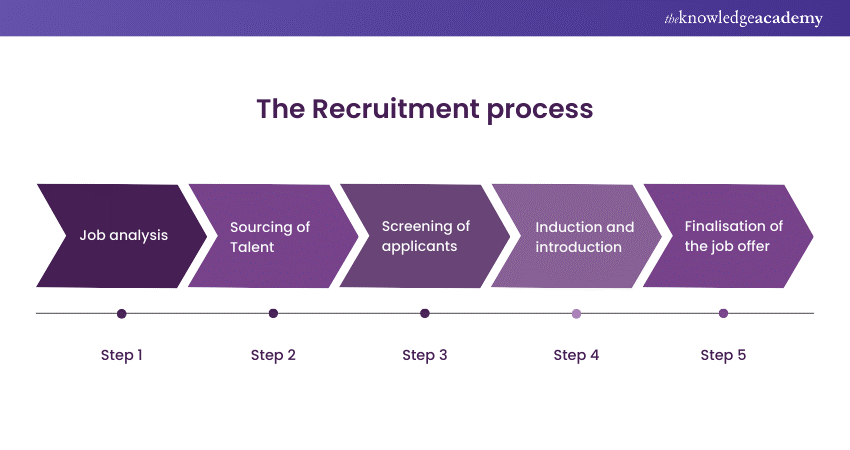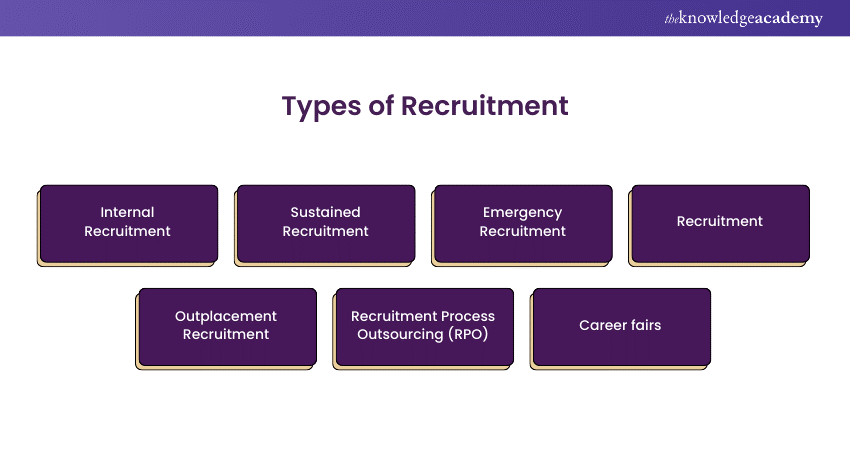We may not have the course you’re looking for. If you enquire or give us a call on +32 35001305 and speak to our training experts, we may still be able to help with your training requirements.
Training Outcomes Within Your Budget!
We ensure quality, budget-alignment, and timely delivery by our expert instructors.

Recruitment in Human Resource Management (HRM) entails the business function that undertakes the identifying, interviewing, selection, and hiring of consumers. It involves all the actions undertaken, including the process from the assessment of staffing demand up to meeting it in a timely and cost-efficient manner. To learn further about this approach, read this blog. In this blog, we will discuss What is Recruitment, its importance, and its impact on an organisation.
Table of Contents
1) What is Recruitment?
2) Why is Recruitment important?
3) The Recruitment process
4) Types of Recruitment
5) Best practices in Recruitment
6) Conclusion
What is Recruitment?
Recruitment meaning actively searching for, interviewing, and hiring qualified candidates to fill positions within an organisation. This process starts with identifying the company's needs and ends with the admission of employees to the organisation. Recruitment can also be interpreted as finding potential employees and encouraging them to apply.
The Recruitment Process is primarily implemented to find individuals best qualified for positions within the company. The typical idea behind this process is to hire individuals to help the organisation achieve professional goals. Through Recruitment, organisations also ensure that the company's workforce is aligned with its initiatives and goals.
Why is Recruitment important?
Recruitment can help organisations overcome the difficulty of finding and attracting the right individuals for particular positions. The right Recruitment process helps consolidate the strength of the company's human resources, boosts team spirit, ensures the company's development, and supports business growth.
Through the selection process, the organisation can attract candidates with the necessary skills whose ethics matches its principles. This positively affects productivity, staff satisfaction, and retention rates, which help the organisation achieve its most profitable objectives.
The Recruitment process
Organisations integrate their Recruitment processes depending on their structure and specific needs. We will, however, investigate the general approach of the Recruitment process adopted by most organisations and companies. Here's a complete breakdown of the Recruitment Process:

1) Job analysis
This step allows the Human Resources (HR) Manager to analyse the suitability of potential job applicants against the job role. They develop a detailed job description that includes the title and purpose of the position. Once the job description is created, it is reviewed for accuracy and checked to see if it is an updated version.
The HR department sets the basic requirements an applicant must meet to be considered suitable for a position. They may also include other preferred skills or qualifications beyond the minimum or essential qualifications. Finally, they define a salary range to compensate for the position's duties and responsibilities.
2) Sourcing of talent
This is the step where the organisation lets everyone know there is an open position, and they are looking for someone to fill it. The organisation uses various methods to advertise an open position. Some of these include networking through word of mouth, posting job on various social media platforms, advertising in newspapers, and using the company's reputation to attract candidates.
3) Screening of applicants
This is where the job applicant's skill and personality are tested and evaluated to determine if he or she is the best candidate. First, pre-screening narrows the list of candidates and leaves only those who meet or exceed the minimum requirements.
Applicants who have passed the screening then undergo an entrance interview. This basic interview is usually conducted over the phone or in person to evaluate or assess the basic skills relevant to the job.
Further, hiring managers conduct a test to gain access to candidates' skills. Hiring managers conduct a series of interviews depending on the number of available participants for that position. Further, the Hiring managers finally selects among the candidates.
4) Finalisation of the job offer
The final stage of the Recruitment process is the review process, where the chosen candidate is offered the job and assigned the specific position. The Recruiter sends an offer, and the applicant responds affirmatively, and then they join forces on an agreement.
5) Induction and introduction
The signing of the employment contract marks the beginning of the employment process. What follows is the employee's decision and notification of the joining date.
Learn more about the Recruitment process with our Recruitment Training – sign up now!
Types of Recruitment
After learning about What is Recruitment, it’s time to learn its various types. Various Recruiting techniques can help the talent acquisition team attract and filter candidates. Let’s look at some of them:

Internal Recruitment
This type of Recruitment requires the filling out job vacancies in an organisation. These vacancies are filled by current employees within the organisation. There are several methods which are involved in this type of Internal Recruitment:
a) Promotions: The most deserving employee is promoted to a higher position. This type of promotion encourages motivation, and the employees retain their loyalty to the organisation.
b) Transfer: An employee is moved to a different location or department according to their expertise. This helps in optimising the business processes and presents the employees with new challenges to work on.
c) Employee referrals: Here, employees refer to other known candidates for the vacant positions in their organisation. This helps the Hiring managers speed up their Recruitment process, and the integration of the referred employees is quite seamless in the organisation as they are already familiar with the policies and culture of the organisation.
External Recruitment
In this type of Recruitment, Hiring managers opt for different channels to hire candidates, which brings a new variety of skills and knowledge to the organisation. Several methods are involved in external Recruitment:
a) Job advertisements: Several job vacancies are posted regularly on different channels, which attracts many candidates. These advertisements can be tailored to reach the required demographics and candidates with skills.
b) Recruitment agencies: Several special Recruitment agencies help many candidates find their desired roles. This helps the HR Managers a lot as they don’t have to again go through the entire process.
c) Campus Recruitment: Campus Recruitment is one of the major areas where HR managers can find their desired candidates. Mostly, these candidates are freshers or graduates, which gives organisations a chance to foster new talents and work ethics.
Master the Recruitment training with Safer Recruitment Masterclass Course – sign up today!
Best practices in Recruitment
Every company wants to have the best talent on board. To do this effectively, you need the best Recruitment practices. Let's dive into today's most effective Recruitment practices. Let's dive into today's most effective Recruiting practices:
a) Define your brand: When people look for jobs, they often start with well-known brands they know and trust. Project the brand as such and communicate the company's goals accordingly.
b) Use social media: Advertise jobs and answer questions about positions in social media posts. Great talent is often found among those who follow the brand.
c) Invest in qualified Recruiters: The best people should be employed to conduct the Recruitment process. The organisation should also ensure a continuous guide to becoming a good recruiter for a better action plan.
d) Use smart sourcing tools and technologies: Reduce hiring costs with smart sourcing tools and technologies. This ensures a level playing field between small and large companies.
e) Implement good candidate relationship management strategies: Create a good communication process where candidates, employees, and the organisation can communicate freely and directly.
f) Compliance management: Compliance management should not only automate and streamline the Recruitment process but also ensure that everything is properly documented and archived.
g) Engage the organisation's employees: An organisation should encourage employee involvement in the hiring process, and one way to do this is to create and maintain a strong employee referral program.
Unlock the best Recruitment practices with our Recruiting for Success Training – join today!
Conclusion
We hope that from this blog, you understood What is Recruitment and how it can play a major role in organisations. There are several types of Recrutiment which the HR managers can implement to find candidates with new skills and backgrounds that can contribute to the progress of the organisation.
Learn more about Recruitment and HR management with Online Recruiter Masterclass - sign up today!
Frequently Asked Questions

The latest trends in Recruiting include a focus on diversity, equity, and inclusion initiatives, the utilisation of Artificial Intelligence for streamlined hiring processes, an emphasis on candidate experience, remote and flexible working options, skills-based hiring over traditional credentials, and leveraging social media for employer branding and outreach.

To make the hiring process more efficient, companies can use AI and automation for initial screenings, implement structured interviews to ensure consistency, focus on skills-based assessments, leverage social media for wider reach, streamline communication with candidates through integrated platforms, and gather feedback to continuously improve the process.

The Knowledge Academy takes global learning to new heights, offering over 30,000 online courses across 490+ locations in 220 countries. This expansive reach ensures accessibility and convenience for learners worldwide.
Alongside our diverse Online Course Catalogue, encompassing 17 major categories, we go the extra mile by providing a plethora of free educational Online Resources like News updates, Blogs, videos, webinars, and interview questions. Tailoring learning experiences further, professionals can maximise value with customisable Course Bundles of TKA.

The Knowledge Academy’s Knowledge Pass, a prepaid voucher, adds another layer of flexibility, allowing course bookings over a 12-month period. Join us on a journey where education knows no bounds.

The Knowledge Academy offers various HR courses, including Certified HR Advisor, Certified HR Manager, and Certified Training and Development Manager. These courses cater to different skill levels, providing comprehensive insights into HR Skills.
Our HR blogs cover a range of topics related to HR skills, offering valuable resources, best practices, and industry insights. Whether you are a beginner or looking to advance your HR skills, The Knowledge Academy's diverse courses and informative blogs have you covered.
Upcoming HR Resources – Learn about Human Resources Batches & Dates
Date
 Recruiting for Success Training
Recruiting for Success Training
Fri 14th Feb 2025
Fri 11th Apr 2025
Fri 13th Jun 2025
Fri 15th Aug 2025
Fri 10th Oct 2025
Fri 12th Dec 2025







 Top Rated Course
Top Rated Course



 If you wish to make any changes to your course, please
If you wish to make any changes to your course, please


